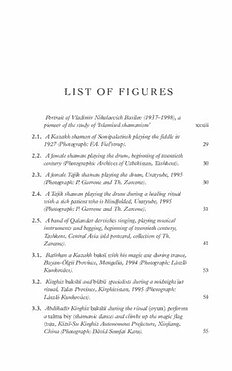
Shamanism and Islam: Sufism, Healing Rituals and Spirits in the Muslim World PDF
394 Pages·2013·19.176 MB·English
Most books are stored in the elastic cloud where traffic is expensive. For this reason, we have a limit on daily download.
Preview Shamanism and Islam: Sufism, Healing Rituals and Spirits in the Muslim World
Description:
The figure of the shaman has always been a prominent motif within the Islamic world, particularly in relation to the mystical domain of Sufism. Here, Thierry Zarcone and Angela Hobart bring together a vigorous and authoritative exploration of the link between Islam and shamanism in contemporary Muslim culture, examining how the old practice of shamanism was combined with elements of Sufism in order to adapt to wider Islamic society. Shamanism and Islam thus surveys shamanic practices in Central Asia, the Middle East, North Africa and the Balkans, to show how the Muslim shaman, like his Siberian counterpart, cultivates personal relations with spirits to help individuals through healing and divination. Here, two different kinds of healers are examined: firstly, the shaman healers of Central Asia, which belong to several different traditions, and yet all have the common thread of mixing Islam - especially Sufism - with old religious practices.This ‘Islamized shamanism’, covering the geographic areas of modern-day Kazakhstan, Uzbekistan, Tajikistan, Kirghizstan, northern Afghanistan, the Turkoman province of Iran and the Uygur district of Xinjian province of China, is analysed through its rituals, represenations and modern manifestations. Secondly, the book explores the examples of healers from different parts of the Islamic world outside central Asia, from Iran to Turkey, and from Algeria to the suburbs of Paris. Using healing rituals that are extremely similar to those performed in Central Asian ‘Islamised shamanism’, Shamanism and Islam draws out the parallels that exist throughout the Islamic World, and the close relations between shamanism and Muslim mysticism. Exploring the complexities and variety of rituals, involving music, dance and, in some regions, epic and bardic poetry, demonstrating the close links between shamanism and the various arts of the Islamic world, this is the first in-depth exploration of ‘Islamized shamanism’. It is thus a valuable contribution to the field of Islamic Studies, Religion, Anthropology, and an understanding of the Middle East more widely.
See more
The list of books you might like
Most books are stored in the elastic cloud where traffic is expensive. For this reason, we have a limit on daily download.
